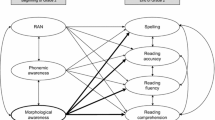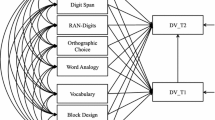Abstract
In this study, we compared 41 adults in a basic literacy class with 92 achievement-level-matched children on their use of English print conventions, as inferred by a qualitative analysis of spelling errors. The two groups followed similar patterns in their mastery of basic spelling features, including letter reversals, consonant blends, and short vowels, with the adults showing relatively more advanced skill in using orthographic patterns. However, the adults made a preponderance of misspellings that were rarely made by the children, including omissions, substitutions, and additions of derivational and inflectional morphemes, and neglect of word endings in general. The findings indicate clear morphological difficulties along with more subtle phonological coding deficits. We suggest that low literacy adults would benefit from specific direct instruction in linguistic analysis, with particular attention to the morphological principles underlying inflections and derivations. Such instruction should be based on a careful assessment of reading and spelling knowledge.
Similar content being viewed by others
References
Aaron, P. G. (1989).Dyslexia and hyperlexia: Diagnosis and management of developmental reading disabilities. Dordrecht/Boston/London: Kluwer Academic Publishers.
Adams, M. J. (1990).Beginning to read: Thinking and learning about print. Cambridge, MA: MIT Press.
Badian, N. A. (1994). Do dyslexic and other poor readers differ in reading-related cognitive skills?,Reading and Writing: An Interdisciplinary Journal 6: 45–63.
Bailet, L. L. (1990). Spelling rule usage among students with learning disabilities and normally achieving students,Journal of Learning Disabilities 23: 121–128.
Bailet, L. L. & Lyon, G. R. (1986). Deficient linguistic rule application in an LD speller: A case study,Journal of Learning Disabilities 18: 162–165.
Bear, D. & Barone, D. (1989). Using children's spellings to group for word study and directed reading in the primary classroom,Reading Psychology 10: 275–2992.
Bear, D., Truex, P. & Barone, D. (1990). In search of meaningful diagnosis: Spelling-by-stage assessment of literacy proficiency,Adult Literacy and Basic Education 13: 165–185.
Beers, J. W. & Henderson, E. H. (1977). A study of developing orthographic concepts among first grade children,Research in the Teaching of English 11: 133–1488.
Brady, S. (1986). Short-term memory, phonological processing, and reading ability,Annals of Dyslexia 36: 138–153.
Bock, J. K. (1982). Toward a cognitive psychology of syntax: Information processing contributions to sentence formulation,Psychological Review 89: 1–97.
Calfee, R. (1991). Decoding and spelling: What to teach; when to teach it; how to teach it,Psychological Science 2: 83–85.
Carlisle, J. F. (1987). The use of morphological knowledge in spelling derived forms by learning disabled and normal students,Annals of Dyslexia 37: 90–108.
Clay, M. M. (1979).What did I write? Exeter, NH: Heinemann.
Cunningham, P. M. (1991).Phonics they use. New York: Harper Collins.
Ehri, L. (1987). Learning to read and spell words,Journal of Reading Behavior 19: 5–29.
Ehri, L. C. & Robbins, C. (1992). Beginners need some decoding skill to read words by analogy,Reading Research Quarterly 27: 12–27.
Fischer, F. W., Shankweiler, D. & Liberman, I. Y. (1985). Spelling proficiency and sensitivity to word structure,Journal of Memory and Language 24: 423–441.
Goswami, U. & Bryant, P. (1990).Phonological skills and learning to read. Hillsdale, NJ: Erlbaum.
Goswami, U. & Mead, F. (1992). Onset and rime awareness and analogies in reading,Reading Research Quarterly 27: 152–163.
Henderson, E. H. & Templeton, S. (1986). A developmental perspective of formal spelling instruction through alphabet, pattern, and meaning,The Elementary School Journal 86: 305–316.
Juel, C. (1992). Including all children in the literary culture of school. Paper presented at the George Graham Lectures in Reading. Charlottesville, VA: University of Virginia.
Kitz, W. R. (1988). Adult literacy: A review of the past and a proposal for the future,Remedial and Special Education 9: 44–50.
Liberman, I. Y., Rubin, H., Duques, S. & Carlisle, J. (1985). Linguistic abilities and spelling proficiency in kindergarteners and adult poor spellers. In: D. B. Gray & J. F. Kavanagh (eds.),Biobehavioral measures of dyslexia (pp. 163–176). Parkton, MD: York Press.
Mann, V. A. (1993). Phonemic awareness and future reading ability,Journal of Learning Disabilities 26: 259–269.
Marcel, T. (1980). Phonological awareness and phonological representation: Investigation of a specific spelling problem. In: U. Frith (ed.),Cognitive processes in spelling (pp. 373–403). New York: Academic Press.
Moats, L. C. (1993). Spelling error interpretation: Beyond the phonetic/dysphonetic dichotomy,Annals of Dyslexia 43: 174–185.
Moats, L. C. (1983). A comparison of the spelling errors of older dyslexic and second grade normal children,Annals of Dyslexia 33: 121–139.
Morris, D., Nelson, L. & Perney, J. (1986). Exploring the concept of ‘spelling instructional level’ through the analysis of error-types,The Elementary School Journal 87: 181–200.
Morris, D. & Perney, J. (1984). Developmental spelling as a predictor of first grade reading achievement,The Elementary School Journal 84: 441–457.
Myers, D. T. (1984).Understanding language. Upper Montclair, NJ: Boynton/Cook.
Newman, A. P. (1993). Instructional materials review,Adult Basic Education 3: 126–130.
Pennington, B. G., McCabe, L. L., Smith, S. D., Lefly, D. L., Bookman, M. O., Kimberling, W. J. & Lubs, H. A. (1986). Spelling errors in adults with a form of familial dyslexia,Child Development 57: 1001–1013.
Rack, J. P., Snowling, M. J. & Olson, R. K. (1992). The nonword reading deficit in developmental dyslexia: A review,Reading Research Quarterly 27: 29–53.
Read, C. (1991). Literacy and language variations. Paper presented at the George Graham Lectures in Reading. Charlottesville, VA: University of Virginia.
Read, C. (1988). Adults who read like children: The psycholinguistic bases. (Final report on OERI Grant No. G008710016.) US Department of Education.
Read, C. (1971). Preschool children's knowledge of English phonology,Harvard Educational Review 41: 1–34.
Schlagal, R. C. (1982). A qualitative inventory of word knowledge: A developmental study of spelling, grades one through six. Unpublished doctoral dissertation. Charlottesville, VA: University of Virginia.
Snowling, M., Goulandris, N., Bowlby, M. & Howell, P. (1986). Segmentation and speech perception in relation to reading skill: A developmental analysis,Journal of Experimental Child Psychology 41: 489–507.
Stanovich, K. E. (1988). Explaining the differences between the dyslexic and the garden-variety poor reader: The phonological-core variable-difference model,Journal of Learning Disabilities 21: 590–612.
Stanovich, K. E., Nathan, R. G. & Zolman, J. E. (1988). The developmental lag hypothesis in reading: Longitudinal and matched reading-level comparisons,Child Development 59: 71–86.
Sterling, C. M. (1983). Spelling errors in context,British Journal of Psychology 74: 353–364.
Stothard, S. E. & Hulme, C. (1995). A comparison of phonological skills in children with reading comprehension difficulties and children with decoding difficulties,Journal of Child Psychology and Psychiatry 36: 399–408.
Strickland, D. S. & Cullinan, B. (1991). Afterword. In: M. Adams,Beginning to read: Thinking and learning about print. Cambridge, MA: MIT Press.
Tangel, D. & Blachman, B. (1992). Effects of phoneme awareness instruction on kindergarten children's invented spelling,Journal of Reading Behavior 24: 233–261.
Temple, C. M. & Marshall, J. C. (1983). A case study of developmental phonological dyslexia,British Journal of Psychology 74: 517–533.
Templeton, S. (1983). Using the spelling/meaning connection to develop word knowledge in older students,Journal of Reading 27: 8–14.
Treiman, R. (1993).Beginning to spell: A study of first-grade children. New York: Oxford University Press.
Viise, N. M. (1992). A comparison of child and adult spelling development. Unpublished doctoral dissertation. Charlottesville, VA: University of Virginia.
Viise, N. M. (1995). A study of adult spelling development. Manuscript submitted for publication.
Wolf, M. & Goodglass, H. (1986). Dyslexia, dysnomia, and lexical retrieval: A longitudinal investigation,Brain and Language 28: 154–168.
Worthy, M. J. & Invernizzi, M. A. (1990). Spelling errors of normal and disabled students on achievement levels one through four: Instructional implications,Annals of Dyslexia 40: 138–151.
Worthy, J. & Viise, N. M. (1993). Problems that don't go away: The phonological deficit in adults of low-literacy. Paper presented at the annual meeting of the American Educational Research Institution, Atlanta, GA.
Zutell, J. & Rasinski, T. (1989). Reading and spelling connections in third and fifth grade students,Reading Psychology 10: 137–155.
Author information
Authors and Affiliations
Corresponding author
Rights and permissions
About this article
Cite this article
Worthy, J., Viise, N.M. Morphological, phonological, and orthographic differences between the spelling of normally achieving children and basic literacy adults. Read Writ 8, 139–159 (1996). https://doi.org/10.1007/BF00555366
Issue Date:
DOI: https://doi.org/10.1007/BF00555366




